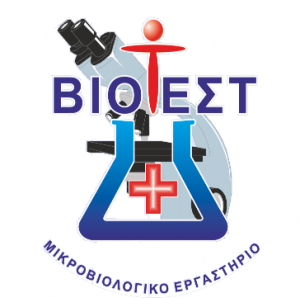Departments

What we offer
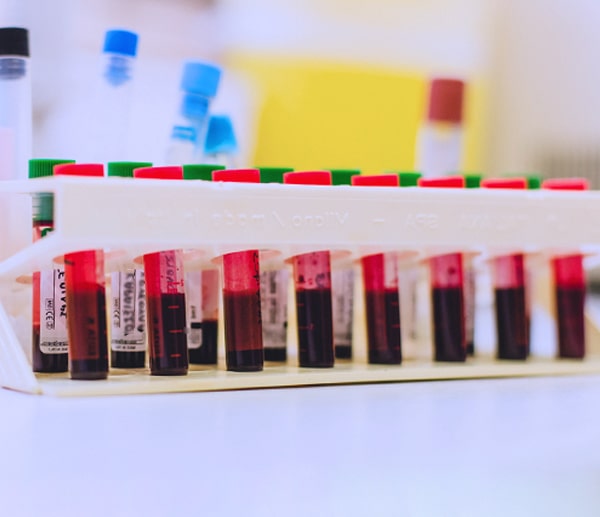
Hematology Department
Hematology is a branch of medicine and other biological sciences that focuses on the study of the hematopoietic system, its organs, and more specifically, its amorphous and shaped components. In the hematology department, with the help of a modern hematologist, all routine examinations for the diagnosis of diseases are performed.
The main exams are:
- General Blood Count, Erythrocyte Sedimentation Rate (ESR),
- Coombs (indirect and direct)
- Reticulocytes, G-6-PD
- Blood type, Rhesus
- Microscopic study of peripheral blood smear
- Study of hemoglobinopathies (Mediterranean anemia, other thalassaemias, sickle cell syndromes, etc.)
- Hemostasis study (coagulation test)

Hematology Department
Hematology is a branch of medicine and other biological sciences that focuses on the study of the hematopoietic system, its organs, and more specifically, its amorphous and shaped components. In the hematology department, with the help of a modern hematologist, all routine examinations for the diagnosis of diseases are performed.
The main exams are:
- General Blood Count, Erythrocyte Sedimentation Rate (ESR),
- Coombs (indirect and direct)
- Reticulocytes, G-6-PD
- Blood type, Rhesus
- Microscopic study of peripheral blood smear
- Study of hemoglobinopathies (Mediterranean anemia, other thalassaemias, sickle cell syndromes, etc.)
- Hemostasis study (coagulation test)
Biochemical Department
The biochemical department studies with the help of chemical reactions, substances that are in the body, thus drawing useful conclusions for the overall function of the body, as well as the function of individual organs. Modern, automated biochemical analyzers are used.
The main exams are:
- Routine biochemical tests (Glucose, Urea, Creatinine, Uric Acid, cholesterol, triglycerides, HDL, LDL, Transaminases-SGOT, SGPT, Alkaline Phosphatase, γ-GT, CPK, LDH,Bilirubin direct & indirect,Total protein,Albumin, Iron etc.)
- Diabetes Monitoring – HbA1C Measurement
- Cardiac function indicators
- Indicators of liver function
- Indicators of renal function
- Electrolyte assays (K, Na, Ca, P, Mg, Cl).
- Drug levels

Biochemical Department
The biochemical department studies with the help of chemical reactions, substances that are in the body, thus drawing useful conclusions for the overall function of the body, as well as the function of individual organs. Modern, automated biochemical analyzers are used.
The main exams are:
- Routine biochemical tests (Glucose, Urea, Creatinine, Uric Acid, cholesterol, triglycerides, HDL, LDL, Transaminases-SGOT, SGPT, Alkaline Phosphatase, γ-GT, CPK, LDH,Bilirubin direct & indirect,Total protein,Albumin, Iron etc.)
- Diabetes Monitoring – HbA1C Measurement
- Cardiac function indicators
- Indicators of liver function
- Indicators of renal function
- Electrolyte assays (K, Na, Ca, P, Mg, Cl).
- Drug levels


Hormone Department
Hormones are chemical compounds that are produced in a part of the body (eg pituitary gland, thyroid gland, endocrine glands, adrenal glands, etc.), and are transported through the blood to other distant organs or tissues, where they act. The hormonal effect takes place at receptors on target cells, where it results in their activation.
The hormone department performs all hormone-related tests, with the help of modern and automated systems and analyzers, such as:
- Thyroid gland
- Parathyroid
- Pituitary gland
- Male-Female Fertility
- Androgens
- Osteoporosis
- Diabetes
- Adrenal glands
- Prenatal control
The main exams are:
- TSH, T3, T4, Free T3, T4 (FT3, FT4), Anti-TPO, Anti – TG, TSI, TG-thyroglobulin, β-HCG (chorionic gonadotropin), E2 (Estradiol), FSH, LH, PRG, PRL , Testosterone, 17-OH-PRG, DHEA, DHEA-S, Renin, Aldosterone, Cortisol etc.
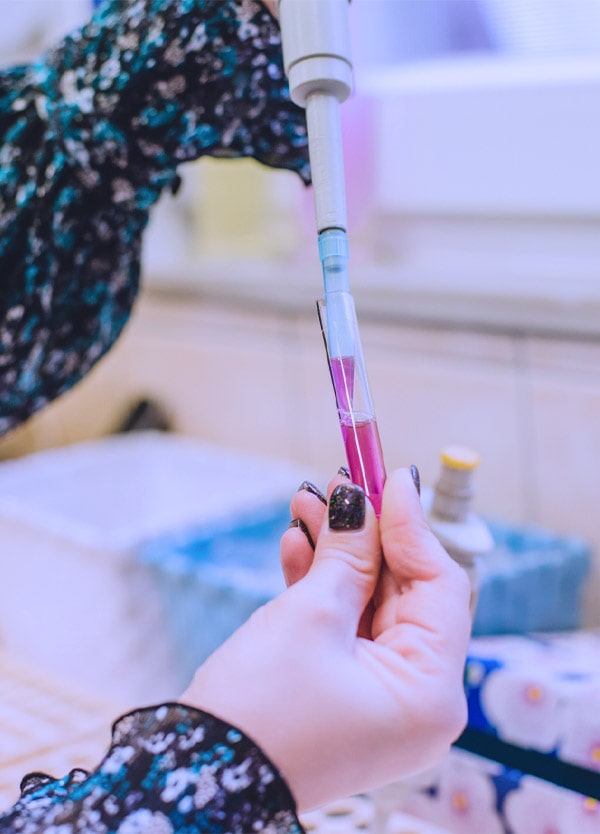
Hormone Department
Hormones are chemical compounds that are produced in a part of the body (eg pituitary gland, thyroid gland, endocrine glands, adrenal glands, etc.), and are transported through the blood to other distant organs or tissues, where they act. The hormonal effect takes place at receptors on target cells, where it results in their activation.
The hormone department performs all hormone-related tests, with the help of modern and automated systems and analyzers, such as:
- Thyroid gland
- Parathyroid
- Pituitary gland
- Male-Female Fertility
- Androgens
- Osteoporosis
- Diabetes
- Adrenal glands
- Prenatal control
The main exams are:
- TSH, T3, T4, Free T3, T4 (FT3, FT4), Anti-TPO, Anti – TG, TSI, TG-thyroglobulin, β-HCG (chorionic gonadotropin), E2 (Estradiol), FSH, LH, PRG, PRL , Testosterone, 17-OH-PRG, DHEA, DHEA-S, Renin, Aldosterone, Cortisol etc.
Department of Microbiology
Microbiology is a branch of Medicine and Biology that focuses on the study of these microorganisms, their different properties, as well as their clinical applications. In the Microbiology department, all the basic tests are performed for the detection and identification of microorganisms in various biological fluids.
The main exams are:
- Cultivation of biological samples (urine, feces, semen, vaginal discharge, sputum, ear discharge, etc.)
- Isolation and identification of germs
- Antibiotic susceptibility testing (antibiogram)
- Test for Chlamydia, Ureaplasma, Mycoplasma.
- Search for parasites-fungi in various materials.
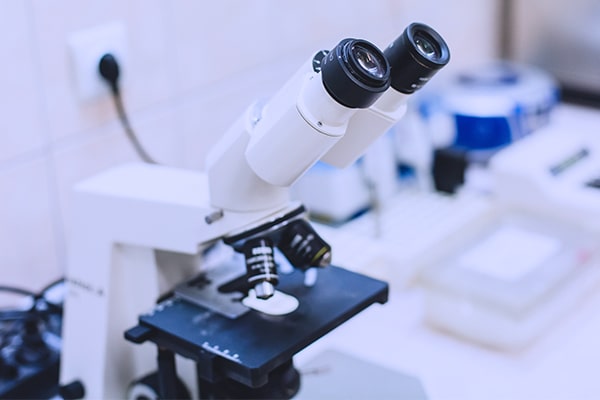
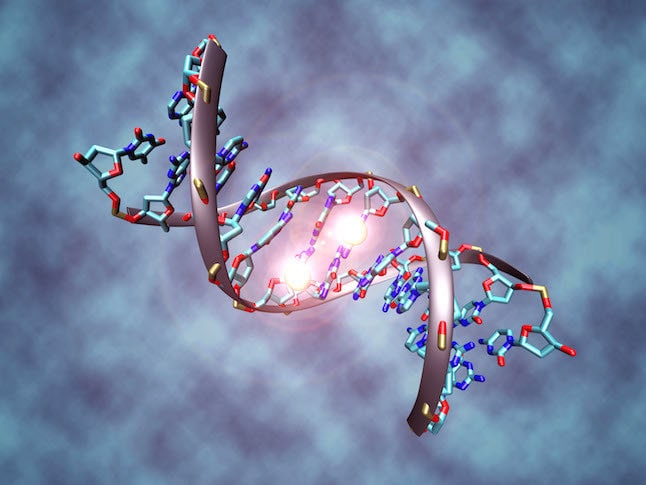
Molecular Department
In the Molecular Department, tests are performed that study genetic material (DNA) and relate to the detection and identification of mutations related to inherited diseases (prevention-predisposition-early diagnosis) as well as the detection of genetic material of microbes (molecular microbiology).
The main exams are:
- Molecular Testing of Thrombophilia
- Cystic fibrosis control
- HLAB27 standardization
- Molecular microbiology tests (COVID 19 etc.)
Department of Fertility and Prenatal Control
Prenatal screening involves a set of tests that need to be done in early pregnancy or before the couple starts trying. This is a very important series of tests for the safety of the mother but mainly for the safety of the child. In our laboratory, the examination of the sperm diagram is carried out, according to the latest instructions of the World Health Organization. Fertility is also related to many tests that have been reported in other parts of our laboratory, such as hormones, cultures, immunological tests.
The main exams are:
Basic antenatal check-up
- Vaginal smear cultures (Test for Mycoplasmas, Ureaplasmas and Chlamydia – Test for Streptococcus agalactiae)
- A-test or triple test (Chorionic gonadotropin, α-Fetoprotein, Free Estriol) in the 2nd trimester of pregnancy (15th to 20th week of pregnancy)
- PAPP-A test (Fb-hCG, PAPP-A, cervical transparency) in the 1st trimester of pregnancy (10th to 14th week of pregnancy)
- Molecular control of thrombophilia
- ‘Cystic fibrosis control
- Antimullerian hormone (AMH)
- Sperm profile and sperm culture

Department of Fertility and Prenatal Control
Prenatal screening involves a set of tests that need to be done in early pregnancy or before the couple starts trying. This is a very important series of tests for the safety of the mother but mainly for the safety of the child. In our laboratory, the examination of the sperm diagram is carried out, according to the latest instructions of the World Health Organization. Fertility is also related to many tests that have been reported in other parts of our laboratory, such as hormones, cultures, immunological tests.
The main exams are:
- Basic antenatal check-up
- Vaginal smear cultures (Test for Mycoplasmas, Ureaplasmas and Chlamydia – Test for Streptococcus agalactiae)
- A-test or triple test (Chorionic gonadotropin, α-Fetoprotein, Free Estriol) in the 2nd trimester of pregnancy (15th to 20th week of pregnancy)
- PAPP-A test (Fb-hCG, PAPP-A, cervical transparency) in the 1st trimester of pregnancy (10th to 14th week of pregnancy)
- Molecular control of thrombophilia
- ‘Cystic fibrosis control
- Antimullerian hormone (AMH)
- Sperm profile and sperm culture


Department of Immunology - Virology
The immune system is a remarkable adaptation mechanism, which protects the body from pathogenic microorganisms and diseases such as malignancies. The tests performed in the Immunological – Virological department, check the function of the immune system, the presence of immunity after vaccination or disease, the presence of various infections and their course, while also helping to diagnose autoimmune diseases. With the help of modern and automated analysts, even the most specialized immunological tests can be performed immediately, thus providing a leading role in the clinical diagnosis of diseases.
The main exams are:
- Investigation of autoimmune diseases (Rheumatoid arthritis, Systemic lupus erythematosus, etc.) such as Antinuclear / ANA, Anti-ENA, -DNA, Anti SS-A (Ro), SS-B (La), Anti-Sm, Anti-CCP (Cyclic Citrullinated Peptide Antibody), ASMA, IgA, IgG, IgM, IgD, IgE, Anti-RNP, APCA, c-ANCA, p-ANCA, Anti-SMA, RA-test, β2-Microglobulin, Supplement C3, C4, C total , Anti-dsDNA, Anti-ssDNA, Anti-mitochondrial (AMA) etc.
- Allergy Testing – Search for Allergens (Rast Tests)
- Control of sexually transmitted diseases
- Detection of virus antigens and antibodies against viruses
- Control of infectious diseases such as Hepatitis,Rubella, HIV I / II, Toxoplasma, Cytomegalovirus (CMV), Herpes (HSV), Helicobacter pylori, Chlamydia, Chickenpox (VZV), Listeria, Mycoplasma, Borellia,Brucella, ASTO ,EBV,Measles,Mumps, Anti-echinococcal Abs etc.
- Specific cancer markers such as A-FP, CEA, CA 19-9, CA 15-3, CA 125, CA 50, CA 72-4, NSE, MCA, SCC, TPA, TPS, PSA, PAP, FPSA, FPSA / TPSA .

Department of Immunology - Virology
The immune system is a remarkable adaptation mechanism, which protects the body from pathogenic microorganisms and diseases such as malignancies. The tests performed in the Immunological – Virological department, check the function of the immune system, the presence of immunity after vaccination or disease, the presence of various infections and their course, while also helping to diagnose autoimmune diseases. With the help of modern and automated analysts, even the most specialized immunological tests can be performed immediately, thus providing a leading role in the clinical diagnosis of diseases.
The main exams are:
- Investigation of autoimmune diseases (Rheumatoid arthritis, Systemic lupus erythematosus, etc.) such as Antinuclear / ANA, Anti-ENA, -DNA, Anti SS-A (Ro), SS-B (La), Anti-Sm, Anti-CCP (Cyclic Citrullinated Peptide Antibody), ASMA, IgA, IgG, IgM, IgD, IgE, Anti-RNP, APCA, c-ANCA, p-ANCA, Anti-SMA, RA-test, β2-Microglobulin, Supplement C3, C4, C total , Anti-dsDNA, Anti-ssDNA, Anti-mitochondrial (AMA) etc.
- Allergy Testing – Search for Allergens (Rast Tests)
- Control of sexually transmitted diseases
- Detection of virus antigens and antibodies against viruses
- Control of infectious diseases such as Hepatitis,Rubella, HIV I / II, Toxoplasma, Cytomegalovirus (CMV), Herpes (HSV), Helicobacter pylori, Chlamydia, Chickenpox (VZV), Listeria, Mycoplasma, Borellia,Brucella, ASTO ,EBV,Measles,Mumps, Anti-echinococcal Abs etc.
- Specific cancer markers such as A-FP, CEA, CA 19-9, CA 15-3, CA 125, CA 50, CA 72-4, NSE, MCA, SCC, TPA, TPS, PSA, PAP, FPSA, FPSA / TPSA .

